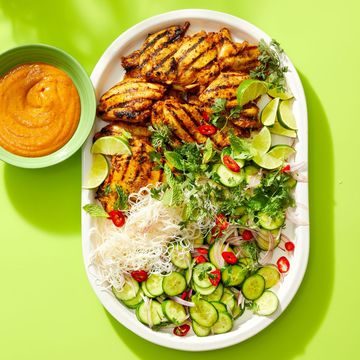Protein, protein, protein. It seems like everyone is pushing it these days. It's true that our bodies need protein to function, but how much is really necessary and is it possible to go overboard? We asked a doctor and a registered dietitian for the truth.
What is protein?
Essentially, protein is a chain of amino acids that every cell in your body needs to do its job. “Protein is the main building block for our body,” says Zhaoping Li, M.D., Ph.D., the director of the Center for Human Nutrition and the chief of the Division of Clinical Nutrition at the David Geffen School of Medicine at UCLA.
The benefits of protein are seemingly endless. “Your body uses protein to repair and build muscle tissue, and it's also part of the structure of your bones, cartilage, skin and blood,” says Samantha Cassetty, M.S., R.D., a nutrition and wellness expert, the founder of Sam’s Plate and co-author of Sugar Shock. “It also helps produce immune cells that fight infections.”
Protein, carbohydrates and fats are the three macronutrients our bodies depend on. However, unlike carbohydrates and fats, protein is not stored in the body, notes Dr. Li. “We have limited protein reserve for a few hours to support our organ system metabolism,” she says. That means we have to eat protein every day to ensure our body has what it needs.
How much protein do we need?
“It gets a little tricky because there’s not a one-size-fits-all number,” says Cassetty. The Dietary Guidelines for Americans recommends that women consume 5 to 6.5 ounces of protein foods every day, while men eat 5.5 to 7 ounces daily.
A general rule of thumb is to eat .8 grams of protein per kilogram of your body weight every day. (That would be about 54 grams for a 150-pound woman.) “Most Americans meet that, but that recommendation is based on the minimum amount needed to prevent deficiency and maintain basic functions — not necessarily the optimal amount to thrive,” says Cassetty.
“Most experts agree that a higher intake — around 1.2 to 2 grams per kilogram of body weight (that's 82-136 grams for a 150-pound woman)— may be better for maintaining muscle mass, managing weight and supporting healthy aging,” Cassetty explains. “Your exact needs depend on things like your age, activity level and goals, but most people would benefit from getting a bit more than the bare minimum.”
Can you eat too much protein?
“There is an upper limit, especially for folks with abnormal kidney function,” says Dr. Li. “But it is generally safe for healthy individuals.” In fact, she says, certain groups of people such as those who have an acute illness, are athletes or are elderly may need more than the general recommendations. To figure out the ideal amounts for your body, “it is important to see a Physician Nutrition Specialist or/and registered dietitian,” adds Dr. Li.
And remember, maintaining a balanced diet is key, even if you’re on a quest for more protein. “I often see people loading up on protein in ways that crowd out other essential nutrients — especially fiber from plant foods,” says Cassetty. “While protein has many benefits, it’s just one piece of a balanced diet. More than 90% of Americans fall short on fiber, so it’s important to zoom out and look at the bigger picture.”
What are the best sources of protein?
Cassetty recommends starting with whole foods before reaching for highly processed protein bars and shakes. “You can get it from both animal and plant sources like chicken, fish, eggs, tofu and pulses (such as beans and lentils),” she says. “Some of my go-to easy options include Greek yogurt, cottage cheese, eggs, canned or pouched tuna and salmon, steamed lentils, frozen edamame and canned chickpeas. Frozen shrimp is great, too — it defrosts quickly and cooks fast.”
In a pinch, she says foods like protein powder, frozen veggie burgers, canned lentil soup and edamame or chickpea pasta can provide protein, but it’s best not to make them everyday staples. “All foods can fit, but they don’t fit equally,” says Cassetty. “Prioritizing whole food sources of protein is a better way to go for your long-term health.”
Melissa Prest, R.D., D.C.N. is a registered dietitian nutritionist and holds a Doctor of Clinical Nutrition degree from Rutgers University. Melissa owns Kidney Nutrition Specialists, a nutrition practice dedicated to helping individuals living with chronic kidney disease, and is the Foundation Dietitian for the National Kidney Foundation of Illinois where she focuses on disease prevention, health education, and nutrition consultation.













